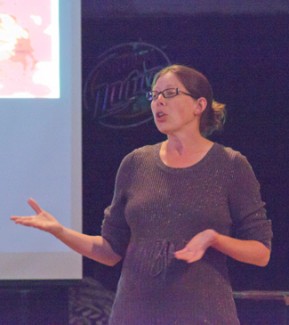Over a decade ago, Idaho was ranked dead last in the amount of money that is spent on biomedical research said Leslie Thompson, the statewide program manager for the Idea Network of Biomedical Research Excellence Program.

Abi Stomberg | Summer Arg
Crystal Kolden, College of Science Assistant Professor, gave a lecture on Wildfires in the West 6 p.m. May 21 during Science on Tap. The event was held at the Moose Lodge.
The program was created in 2001 to provide money for research projects and support graduates and undergraduates, Thomas said.
She said in the past years it has evolved into the INBRE Program, which continues to fund research projects, buis also charged with educating the public on the different scientific research that is being conducted.
Thomas said as a way to educate the public INBRE hosts Science on Tap, or Café Science, which has been successful in Coeur d’Alene for a number of years.
It has been in Moscow for a little over a year, and she said the program has found a home with the Moose Lodge.
“It has a great atmosphere and can really target the general public, so they can learn about a new topic, a science topic,” Thomas said.
Science on Tap is a casual talk that lasts 20 to 30 minutes on a science topic chosen by the speaker.
Thomas said the topics can be anywhere from the latest research in Autism to something as simple as what happens when a person does not wash their hands.
She said the speakers are generally professors from the University of Idaho, but can also be from Washington State University or other surrounding colleges.
“The purpose is to be very casual and very informal,” Thomas said. “The purpose is for the speaker to have nothing but a microphone.”
She said the talks are very interactive, and they want the audience to ask questions.
INBRE hosts four or five Science on Tap talks a year, and the last talk for this school year was on May 21.
Thomas said it was a talk on forest fires, and was very popular.
The talk was titled “Wildfires in the West: what is ‘normal’ in a changing climate?” and was presented by Crystal Kolden, the assistant professor of the College of Science at UI.
Thomas said these talks are important, because when an average person hears the words “biomedical research” they ask what it is, and how it benefits them.
These talks help people understand why biomedical research is important and how it benefits society in the long run.
However, currently there are only about five talks a year, and it has been so successful in Moscow that people ask when there is going to be another one, Thomas said.
To fill in the gaps of the Science on Tap program, the Moose Lodge has started to host a What’s on Tap program, that may have a speaker based around art or history come and talk for the usual time period, said Daniel Hernandez, a Moose Lodge representative.
He said the Science on Tap presentations were so successful, that the Moose Lodge decided to continue that style of program, but based around other themes.
The INBRE program is funded by a $16.6 million grant from the National Institute of Health that is renewable every five years.
“We really encourage everyone,” Thomas said. “It’s an atmosphere where anyone is welcome and we encourage them to come join us.”
Allison Griffith can be reached at [email protected]
